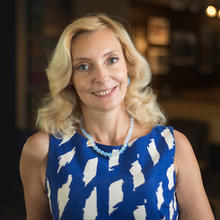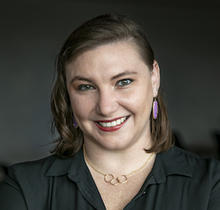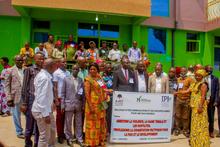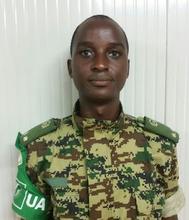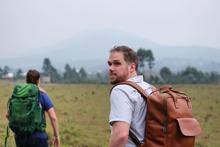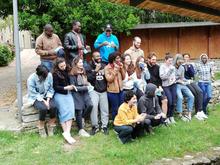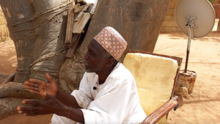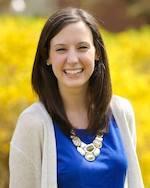Helsing has taught a broad range of subjects, including conflict resolution, analysis of war and peace, negotiations, human rights and conflict, and international relations theory. Prior to joining the Carter School, he spent 23 years at the United States Institute of Peace, including as head of USIP’s Education and Training Department.
- March 4, 2022
The ongoing war in Ukraine is unique from other conflicts, and the international community can take five actions to control the situation, said Karina Korostelina, professor and director of the Program for the Prevention of Mass Violence at George Mason University’s Carter School for Peace and Conflict Resolution.
Korostelina shared her perspective over Zoom:
- February 9, 2022
As a junior and senior at Annandale High School in Virginia, Emily Sample spent her summers as a docent at the Holocaust Memorial Museum in Washington, D.C. She was a teenager who had just lost a friend to police violence, she said, and joining the museum’s Young Ambassadors Program resonated with her.
“I was fascinated and continue to be fascinated by this highly illogical idea of genocide,” said Sample, a PhD candidate at George Mason University’s Carter School for Peace and Conflict Resolution.
- December 14, 2021
The Democratic Republic of the Congo has not seen peace for more than three decades, but in November 2021, George Mason University’s Carter School for Peace and Conflict Resolution helped the country take a leap in a hopeful direction.
In the province of South Kivu, the school gathered representatives from 21 armed groups, the Congolese government, military, police, intelligence services, religious leaders, civil society groups, and peace advocates. Not only did everyone discuss a path toward peacebuilding, but they also signed a peace accord to solidify it.
- November 4, 2021
Isidore Nsengiyumva, only four years old at the time, was in the fields with his father and older brother in Burundi, when suddenly they heard the sound of motors and guns. Troops involved in the country’s civil war attacked their village, and rapidly, their lives were changed.
“We hid in a bush, and when the noise of the guns and fighting subsided, we went back and found our home burned,” Nsengiyumva said. “That’s when my dad decided it was no longer safe.”
- October 14, 2021
A cultural immersion trip in 2008 brought Charles Davidson (PhD ’19) inside the walls of San Pedro prison in La Paz, Bolivia. What he saw there not only changed his life, he said, but ignited a spark of inspiration that led to peacebuilding efforts around the world.
- June 10, 2021
Can enemy groups learn to develop compassion for one another? That was the question Carter School professor Daniel Rothbart set out to answer in his research at Rondine, a two-year “laboratory for peace.” Now, the results are in.
“This is the first in-depth case study of compassion among civilians who live in conflict zones,” said Rothbart, who collaborated with George Mason University professors Thalia Goldstein, Marc Gopin and Karina Korostelina. “We hope this is a model that can help create new practices for peacebuilders to cultivate compassion.”
- May 18, 2021
Following decades of war and genocide in Sudan, in April 2019 a mass movement from civilians overthrew the dictatorship of Omar al-Bashir. As the country transitions to democratic rule, George Mason University’s Carter School for Peace and Conflict Resolution is working to empower civilians to use their voice to impact the future.
The Mason team, working with partners in Sudan, has been interviewing and video recording oral histories of 100 Sudanese civilians who have lived through both war and peace. Their answers, which expand upon their experiences, also include their vision for a just Sudanese society.
- May 13, 2021
The COVID-19 pandemic has made it so most museums are closed, but students and researchers at George Mason University’s John Mitchell, Jr. Program (JMJP) are working hard to create a digital one that sheds light on civil rights pioneers with largely untold stories.
Thanks to an $8,000 grant from Virginia Humanities, the team is building a digital exhibit on the life of anti-lynching advocate John Mitchell, Jr., and his colleagues Frederick Douglass and Ida B. Wells. The grant is part of $181,500 in funding awarded to 25 nonprofits.

